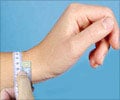A new device aimed at discouraging eaters from bolting their food is a useful tool in combatting childhood obesity, according to a study published online on Wednesday by the British
A new device aimed at discouraging eaters from bolting their food is a useful tool in combatting childhood obesity, according to a study published online on Wednesday by the British Medical Journal (BMJ).
Doctors carried out an 18-month assessment of a small computer-linked scale called a Mandometer, which has been developed by scientists at Sweden's Karolinska Institute.The gadget entails an electronic scale which sits underneath the diner's plate, weighing the remaining food as the meal is consumed.
Sitting next to it, on the table, is a small screen which shows a graph indicating the rate at which the food is being eaten. This line is matched against an ideal graph for consumption, as programmed by a food therapist.
Too much deviation from the "ideal" graph prompts the computer to make a spoken request for the eater to slow down. The idea is to train overweight people to eat less and more slowly, thus helping them to feel satiated.
Researchers at Bristol Royal Hospital for Children and the University of Bristol in western England carried out a test among 106 patients aged between nine and 17 years.
All were clinically obese, meaning they had a body mass index (BMI) of 30 or more. BMI is determined by one's weight in kilos divided by one's height, in metres, squared.
A year later, the Mandometer group had fallen 2.1 points in BMI on average, around triple that of counterparts in the "standard care" group. This improvement was maintained when the investigators carried out a follow-up test at the 18-month mark.
Levels of "good cholesterol" were also much better in the Mandometer group.
The authors, led by Julian Hamilton-Shield, say the Mandometer is a "useful adjunct" in treating obesity among adolescents, a health area where the options outside the use of drugs are few, and call for further tests.
They point out, though, that Mandometer was not a "stand-alone" device in the experiment, as it was used hand-in-hand with education about nutrition and encouragement to do exercise.
Source-AFP
SRM
 MEDINDIA
MEDINDIA




 Email
Email




